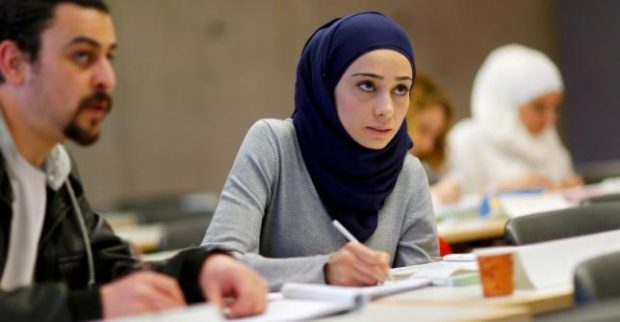Refugee teachers return to school again to train for work in Germany

Syrian asylum seeker Alaa Kassab can’t believe her luck. Four months after arriving in Germany, the 23-year-old English instructor has joined a program that gives refugee teachers German lessons and qualifies them to work in German schools.
Along with 25 other migrants, mainly from Syria, Kassab is spending six hours a day learning German at the University of Potsdam near Berlin. Once her language skills are up to scratch, she will take seminars on the German school system and the teaching methods used here.
“This course is exactly what I wanted – I was so happy when I got it,” she said. “I’m already at the university so I can meet German friends and get to blend in faster.”
Kassab is one of more than a million migrants who arrived in Germany last year. Some politicians argue the record influx could help alleviate a labor shortage caused partly by the ageing of the population, but many newcomers lack the training and language skills that Europe’s largest economy needs.
Nonetheless, the program in Potsdam offers hope that some of the better-educated migrants will be able to take up jobs relatively quickly. Kassab and her peers are expected to start working as teaching assistants in about a year’s time.
“We realized that a lot of the refugees had a background in teaching and refugee children have to go to German schools, so we saw this as a chance to use their cultural similarities and offer refugee children someone they can speak to,” said Andreas Musil, vice president for teaching at the University of Potsdam.
More than 700 migrants applied for the scheme that was originally supposed to offer 15 places. The university now aims to have 75 migrants on the program by mid-2016.
Germany urgently needs more teachers to educate refugee children, of which there are 4,000 in the eastern state of Brandenburg, where Potsdam is located, the university says.
And Kassab says the scheme is such a good way to integrate that it should be expanded to other professions, such as engineering.
“There are a lot of refugees who studied or had jobs … and all of them would like to study or start working, but they don’t know how yet, so they need people to help them and explain to them how to do what they want to do in the future,” she said.
How to submit an Op-Ed: Libyan Express accepts opinion articles on a wide range of topics. Submissions may be sent to oped@libyanexpress.com. Please include ‘Op-Ed’ in the subject line.
- Meloni faces probe over ICC suspect’s release - January 29, 2025
- Google Maps to rename Gulf of Mexico for US users - January 29, 2025
- Libya rejects reports of diplomatic departures - January 28, 2025


